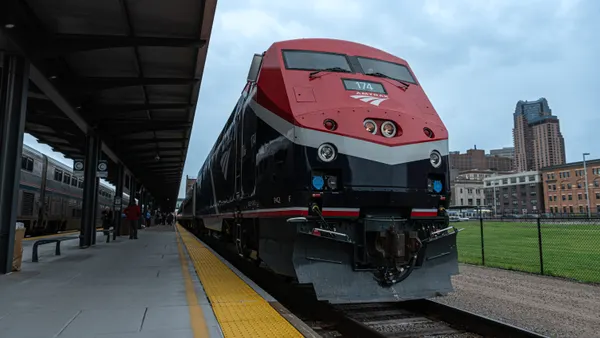Dive Brief:
- Lawmakers in the Virginia General Assembly approved a plan Saturday to give the struggling DC Metro system just over $150 million a year in dedicated funding. With just hours left before the General Assembly adjourned from its annual legislative session, legislators agreed to give Metro $132 million a year, with an extra $22 million from a regional gas tax in Northern Virginia and Hampton Roads.
- A dedicated funding source, which would pay for repairs, and new rail cars and buses as well as other equipment and spending needs, still requires approval from the Maryland General Assembly and the DC City Council. If all three jurisdictions agree, it would be the first dedicated funding stream for Metro since it opened in 1976, and represent around $5 billion in income.
- Metro General Manager Paul Wiedefeld expressed gratitude in a statement. He said the funding will provide a "dedicated funding source" for safety and reliability intiatives.
Dive Insight:
The Washington Post notes Virginia has long been an obstacle to Metro receiving dedicated funding from the jurisdictions — Washington, DC and Maryland — that fund it. And with progress apparent in Maryland too, as Gov. Larry Hogan (R) and the legislature appear to be in agreement, this could be the year it gets done. DC Council, meanwhile, has always favored more investment in Metro.
The beleaguered transit agency has come in for intense criticism in recent years as it has hiked fares and cut service to try and stave off budget shortfalls, but this year lawmakers appear to have momentum as they search for a solution. Keeping that momentum up will be critical and require similar action by Maryland and DC. "[We] have led the way, and challenge our partners, Washington, DC and Maryland, to do their part to make this economically critical system sustainable," Del. Rip Sullivan, D-Arlington, one of the conferees on the legislation and a lawmaker who has Metro in his district, said in a statement.
The Post adds that such high-level cooperation between jurisdictions is rare, but it could help Metro rebuild its reputation and boost the region’s economy. According to its analysis in 2011, Metro boosts property values and tax revenues for the city. It also helps keep more cars off DC's clogged streets.












